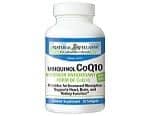

Coenzyme Q10 is a lipid soluble antioxidant that is synthesized in our bodies. It performs an essential function in the production of ATP (adenosine triphosphate) within the mitochondria of every cell in the human body. ATP is the source of cellular energy that is necessary for all of the body’s functions. In organ tissues with high energy requirements – such as the heart, lungs, liver and skeletal muscle – high levels of ATP and, therefore, high concentrations of Coenzyme Q10, are necessary for proper function. Without it we cease to exist.
CoQ10, as it is colloquially known, also performs an antioxidant function, protecting the cell and cell membrane from lipid (fat) peroxidation and oxidative damage to membrane proteins. It also provides antioxidant protection against LDL cholesterol oxidation in the blood vessels. Clearly, Coenzyme Q10 plays a critical role in maintaining normal cardiovascular function as well as preventing cardiovascular disease through its antioxidant properties. What may come as a surprise is the extraordinary range of health benefits that supplementation with this vital nutrient offers.
The Fountain of Youth?
CoQ10 is naturally produced in the human body. It can also be obtained from foods such as organ meats, poultry, fish, eggs, nuts, seeds and some fruits and vegetables. But the milligram amounts are so small, that natural production within the body is the primary supply source.
Unfortunately, as we age, our ability to produce CoQ10 gradually and significantly diminishes. So, if this key ingredient in our body’s natural energy production process declines with age, then it makes sense that our energy levels and strength and vitality will also decline. Beyond moving a little slower and having to take more naps, there are grave consequences to CoQ10 deficiencies as well. These include some very serious and even deadly diseases.
The following is a list of conditions that research indicates can be prevented, reversed or managed by maintaining adequate levels of Coenzyme Q10 in the blood:
- Cardiovascular Disease – CoQ10 is required for proper function of the heart muscle. Insufficiencies have been linked to chronic heart failure. Many cholesterol lowering statin drugs have been shown to deplete CoQ10 levels in the heart, and supplementation is now regularly recommended by cardiologists prescribing statins. CoQ10’s antioxidant effects and its demonstrable ability to prevent blood clots and reduce blood pressure further contribute to its growing reputation as a safe, natural therapy for cardiac support.
- Neurological Disease – Clinical trials at the University of California at San Diego demonstrated a marked reduction in the rate of functional decline in Parkinson’s disease patients who supplemented with Coenzyme Q10. Additional research indicates that CoQ10 may be effective in preventing or managing other neurological conditions related to impaired energy production, such as Huntington’s disease, Alzheimer’s and ALS.
- Cancer – Researchers are showing a connection between dysfunctional mitochondrial energy processes and the reduced ability of cells to perform the process of destroying and removing mutant cells (apoptosis). This compromise of normal cellular function is thought to be a major contributor to the formation and metastasis of such cancers as melanoma, breast and prostate. In addition, CoQ10 is showing promising results in cancer prevention as well as improving outcomes for patients being treated with conventional cancer therapies.
By restoring and maintaining adequate levels of Coenzyme Q10 in the blood, the mitochondria has the fuel to create the energy necessary to perform all functions of normal human metabolism. In addition, the powerful antioxidant protection that CoQ10 offers can prevent or slow mitochondrial degeneration, which is a key component of the aging process. And, so far, there is no evidence of any significant negative effect associated with Coenzyme Q10 supplementation. So, it’s all good news, with one caveat.
All Coenzyme Q10 Is Not Created Equal
CoQ10 exists in two forms: Ubiquinone and Ubiquinol. The root word for the names is “ubiquitous,” which means existing everywhere.
While both forms are Coenzyme Q10, ubiquinone exists in an oxidized state, and ubiquinol in a reduced state. In plain English, ubiquinol has a more powerful antioxidant effect than ubiquinone. This is essential for protecting cellular structures like the mitochondria and cell membranes. In addition, ubiquinol is much more readily absorbed and assimilated into the cells, making it a much more effective form for creating the health benefits associated with CoQ10.
But that’s not all.
Ubiquinol supplements can be found in two forms: the trans and cis isomers. The trans isomer is the type we naturally create in our bodies, and its interactions and benefits are well-documented. Cis isomer ubiquinol is created in a laboratory using a synthetic process. It is as yet unknown whether this form can be utilized in our bodies or whether it will confer the health benefits associated with Coenzyme Q10.
The Long and Short of It
Oxidative stress caused by free radicals is one of the key components of disease, degeneration and the aging process. The mitochondria is the powerhouse of every cell in the human body. Protecting this structure from oxidative stress is essential for normal function of every cell, tissue, organ and system in the human body. Using a high quality trans-isomer form of CoQ10 such as Ubiquinol CoQH is a safe, effective way to protect and restore optimum mitochondrial health and function. The result will be better health, improved energy and higher function of every cell in your body – a younger looking, younger feeling you.




